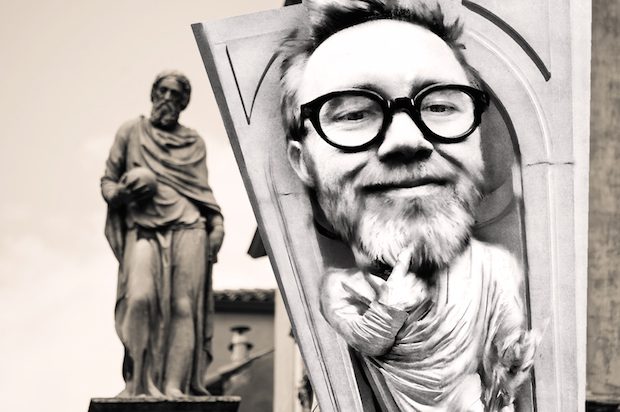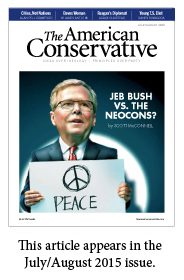Saved by the Divine Comedy

I was once in Florence’s little Dante museum, the Casa di Dante, on a quiet afternoon when an Italian mom and her son were also having a look around. At one point the boy, who appeared to be about five years old, broke free and proceeded to dart from room to room, sing-songing “Dante! Dante! Dante!”
This year, the 750th anniversary of the poet’s birth, lots of others are singing his praises as well—actor Roberto Benigni, reciting Dante in the Italian Senate; Pope Francis, who recommended the Commedia as preparation for the upcoming Holy Year of Mercy; astronaut Samantha Cristoforetti, who read Dante aloud from the International Space Station; and “your working boy,” as American Conservative senior editor Rod Dreher likes to refer to himself.
Early in his new book, Dreher takes pains to say, “I am not Dante,” as a way of reassuring the reader that his own highly personal story of exile is rather different from that of the medieval Italian poet, expelled at age 35 from his beloved Florence, never to return. After all, Dreher writes, “circumstances did not destroy my reputation, reduce me to a wandering beggar, or threaten my life.”
Dreher’s tale is instead one of self-imposed exile from his St. Francisville, Louisiana-based family and his attempts to return home in several ways. How Dante Can Save Your Life intersperses scenes from the author’s life with short sections that introduce the reader to Dante and, more importantly, to Dreher’s experience of reading Dante, creating a book that alternates between two worlds, medieval and modern.
The road to Inferno is paved by personal experience. Dreher’s return to Louisiana as the brother of a dying sister was movingly described in his earlier The Little Way of Ruthie Leming, wherein his lingering, guilty sense of the importance of family and place is made vivid as he witnesses firsthand the local community’s outpouring of devotion during his sister’s last weeks before succumbing to cancer and in the aftermath of her passing. This return is complicated, however, by his discovery of the first of several “family secrets”: that Ruthie’s habit of making disparaging comments about her absent brother has jaundiced her children against their Uncle Rod and left them unenthusiastic about his re-entry into their lives.
Next, his return as a kind of prodigal son—a reconciling act that he hoped would affirm his father’s lifelong insistence on the importance of family—leads to a conversation in which his father confesses that he only remained in St. Francisville all these years because he felt trapped there and had no other option. Noble motives of localism did not play a part. Near the end of this emotional scene, Dreher’s father reflects that his earlier opposition to his son’s move to take up a literary career across the country was also wrongheaded, a matter of sheer stubbornness on his part. All of which Dreher finds rather unsettling.
Finally, his return as a cultural exile likewise has had its ambiguous moments, with a mix of joyful scenes amidst what he calls the “bayou Confucians” along with the inevitable frustrations of relative isolation for a young and bookish family. When health problems—a case of Epstein-Barr virus—were added to his situation, it was enough to leave Rod Dreher in precisely that dark wood where Dante knew that each of us, as Everyman, would eventually arrive in our lives.
This realization came in the summer of 2013, as Dreher, aged 46, was standing in a Barnes & Noble in Baton Rouge browsing the poetry section. He pulled down a copy of the Inferno and opened at the beginning to read: “Midway in the journey of our life / I came to myself in a dark wood, / For the straight way was lost.”
He read on, through the first two cantos, struck by the poet’s depiction of himself as a man trapped “in a thicket of fear and confusion, powerless to escape,” something close to his own feelings of depression and anxiety at that moment. Wild animals, the symbols of pride, lust, and greed, block the poet’s way until a wise guide—the Roman poet Virgil—appears and promises to show him “the hard road to a good place.”
Taking in these lines, Dreher had an epiphany of own, and his Dantean pilgrimage began.
How Dante Can Save Your Life presents a striking mix of topics, of the kind that has earned his blog its substantial following. Thus, in alternation with his comments on the great poem, he ponders variously his experience as a Catholic convert following the clerical abuse scandals a decade or so ago, the latest neuroscience research on the power of stories—bibliotherapy is the new term—the onset of his illness, the nature of Southern traditions, la vie parisienne, and more. Dreher’s Dante turns out to be a warm companion, “simply a fellow wayfarer who has seen great things, both terrifying and glorious, along life’s way, and wants to tell you all about it.” 
The poem, on this reading, is something of an early entry into the self-help sweepstakes—“a practical guide to living” and, as Dreher’s subtitle promises, “life-changing wisdom.”
After some helpful scene-setting and historical background, Dreher plunges into his reading of the Inferno. Like Dante, he realizes he has been sleepwalking through his life and has lost the thread of it—the plot of his own story. “From grand cosmic myths to intimate family tales, it is in stories that we find meaning, purpose, and the truths by which we live—or, if we are unlucky, the lies that lead us astray.”
So we descend through the circles of Hell, a grotesque architecture created by Dante’s extraordinary imagination, reaching in Canto V the famed episode of the lovers Paolo and Francesca, the latter being the literary grandmother of Madame Bovary, Anna Karenina, and other fallen heroines. Here Dreher describes the doomed and eternally adulterous couple’s encounter with the pilgrim Dante. Just as Francesca and her Paolo were drawn into the romantic story of Lancelot and Guinevere, Dreher remembers his own art-inspired love-worship as a younger man and feels dismay at his younger self: “In the music, films, and books closest to my heart, becoming a slave to Lord Love was the summit of all human experience.”
Further on, the inhabitants of the Fourth Circle—the avaricious and the squanderers—inspire another cameo of a family member, Dreher’s great uncle Jimmy, a simple but devoted elderly man whose funeral was the occasion for another revelation about the value of living. The testimonies of Uncle Jimmy’s friends, family and former pastors in his little Southern Baptist church work powerfully to describe the life of a good man and a faithful Christian. “I kept thinking about my late sister Ruthie, and what she and Uncle Jimmy had in common: how they both embodied the principle that there are no sermons more powerful than the loving deeds of a righteous soul.”
Upon reaching the Sixth Circle, the abode of the heretics, Dreher reminds the reader that this journey through Hell eventually brings each of us to confront a sin that has deeply personal relevance. For Dreher, it is here, in the remarkable episode where Dante meets Farinata and Cavalcante, that the “damnable worship of family and place” becomes foremost in his mind:
One way to think of the sin of heresy is mistaking one part of the truth for the whole truth. In this sense, the heresy of Farinata and Cavalcante includes believing that truth consisted in their all-consuming love for family, party, social status, and so forth. The thing is, there is nothing wrong with loving your family, your party, your city, and your creed … . The error comes in believing that these are ultimate ends. To let this disorder reign in one’s heart inevitably results in disorder in the family, in the community, in the city, in the country, everywhere—because everything is connected.
Unlike the doomed Farinata, Dreher comes to realize that he, his father, and his sister loved good things—family and place—too much, allowing them to become idols. Yet further down, amid the false counselors, a voice from a flame—that of the Homeric hero Ulysses, known in the Middle Ages as a legendary voyager—narrates to Dante his tale of sailing beyond the Pillars of Hercules, traditionally understood as the known limits of the world, until a storm sends him and his crew to the ocean floor for his overreaching.
Dante, a man of fierce intellectual ambition, responds with stunned grief at this story, as though sensing, as he has several times before, his own possible fate here. Dreher comments: “Ulysses’s fault was not in pursuing knowledge; his fault was doing so without being guided by morality or divine decree. The misuse of his eloquence, his intelligence, and his courage cast him into hell.” And he reflects further on how his personal literary ambitions have left him with more Ulysses in him than there ought to have been.
Climbing upward through Purgatorio—“Or, How to Be Healed,” as the section has it—we move into a landscape of music, poetry, and human encounters, several of them joyful reunions between Dante and various figures from his earlier life. Just as their various forms of penance provide a discipline for the penitents here, Dreher describes how he comes to learn of and then adopt Orthodox spiritual practices, including the famous Jesus Prayer, in his own quest for a wise asceticism.
For many, the Paradiso—“Or, The Way Things Ought to Be”—is notoriously the most difficult section of the Commedia, which is precisely how Dreher admits he found it. We now journey through a region of pure light and being where Dante’s verse emanates more metaphysics than “practical life-changing wisdom.” Yet the example of St. Francis of Assisi, praised in the Paradiso by no less than St. Thomas Aquinas, offers Dreher the same spiritual antidote to Farinata-like pride in wealth, position and family as it once offered Dante.
One might wish Dreher had made a little more room for topics beyond the bibliotherapeutic, such as the larger themes of history, tradition, and even economics. Florence in Dante’s time was a boomtown, a mix of brilliant patronage of the arts next to the sheerest fraud and self-dealing. Among the bankers and financial concerns were individuals happy to see their family’s coats of arms become mere symbols of profiteering. The intensity of the poet’s anger over the abuse of wealth—through usury, hoarding, or extravagance—in Inferno’s Cantos XVI and XVII is striking, especially to a socially detached and value-free business culture such as ours has become.
Another theme to consider is Farinata’s great civic pride—shared by Dante’s ancestor Cacciaguida elsewhere in the poem—which admittedly has been taken to sinful extremes in his case. Yet it was symptomatic of the distinctive upwelling of civic humanism in the Italian city communes of this time, with the rise of Florence being the most illustrious example of all.
From individuals like Brunetto Latini, Dante’s great teacher, there begins a line that leads to Petrarch and through Coluccio Salutati down to Pico della Mirandola and Erasmus.
Dante felt himself, even at this early date, to be part of this powerful new force aimed at recovering ancient virtú and excellence. The Commedia is, among other things, a great achievement of that recovery. The Florentines sometimes say Dante’s statue should be replaced with one of the obscure Florentine bureaucrat who exiled the poet, for it is he whom we really have to thank for the creation of this great poem. And we have Rod Dreher to thank for reminding us of its greatness today.
Elias Crim is publisher of the group blog Solidarity Hall and will be teaching Dante this fall at Valparaiso University.
Comments